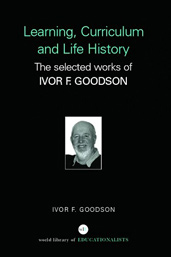Learning, Curriculum and Life Politics: the selected works of Ivor F. Goodson
Towards an Alternative Pedagogy
Some Constraints and Problems
The most obvious constraint to centring a pedagogy around the pupil's inquiry in cooperation with the teacher is that pupils have to attend school and the teacher is responsible for such attendance. Yet this is the constraint within which any style of classroom learning has to operate; it is not a constraint which I see as advocating a transmission model, rather that an alternative pedagogy would better accommodate this fact of classroom life.
A more specific problem relates to the nature of classroom life, for 'the crowds remain to pull at the student's attention and to divert the teacher's energy'. There are two problems associated with an alternative pedagogy. (a) Is 'individual negotiation' possible in the hurly-burly of the classroom? (b) Does a role as an equal learner interfere with the teacher's control capacity? Undoubtedly most people would answer 'yes' at this stage and move on to conclude that only transmission can cope with classroom realities. A number of facts indicate that his could be an outdated perception. In a number of primary school classrooms with 40 or 45 pupils, of often noisy and mobile inclination, an alternative pedagogy has been made to work quite successfully. Exceptional teachers, perhaps, but what of the average teacher? In the upper secondary school the average teacher works in an organization which maximises his opportunity for short, specialized sessions of transmission. As widely reported, it is at this level that 'control' is most difficult: where transmission is maximized 'control' problems are greatest. Even as a 'survival technique' it would appear that transmission is outmoded: the pedagogy and associated organizational structure work against the establishment of those individual and personal relationships which as well as alleviating 'control' problems might sever to increase the educative potential of the teacher.
The contradictions in transmission pedagogy have already encouraged new developments in our classrooms. Clearly the development of an alternative pedagogy can only be part of a much larger scheme of transformation, but acknowledgement of the enormity of the task should not inhibit developments, for this would seem one important place to begin. By exploring an alternative pedagogy in their classrooms, teachers can clarify what is possible in schools, what purposes schools serve in our society, and perhaps bring new understandings of the rhetoric of transmission. That is a long way from accepting that transmission is teaching.
For 'progressive' models of education the development of an alternative pedagogy would provide that coherent and positive view of the teacher's involvement that has so far seemed lacking. Active challenging of and collaboration with the child might then have been seen as criteria for a successful pedagogy, rather than an outmoded pattern of teacher domination. Further, an alternative pedagogy should move beyond the individual negotiations that this chapter has concentrated on; collective and group aspects need to be developed. From an individual knowledge of and relationship with each student the teacher can then and only then, broaden his curriculum and group involvement. And from a clear definition of pedagogy new definitions of school and classroom might begin.
